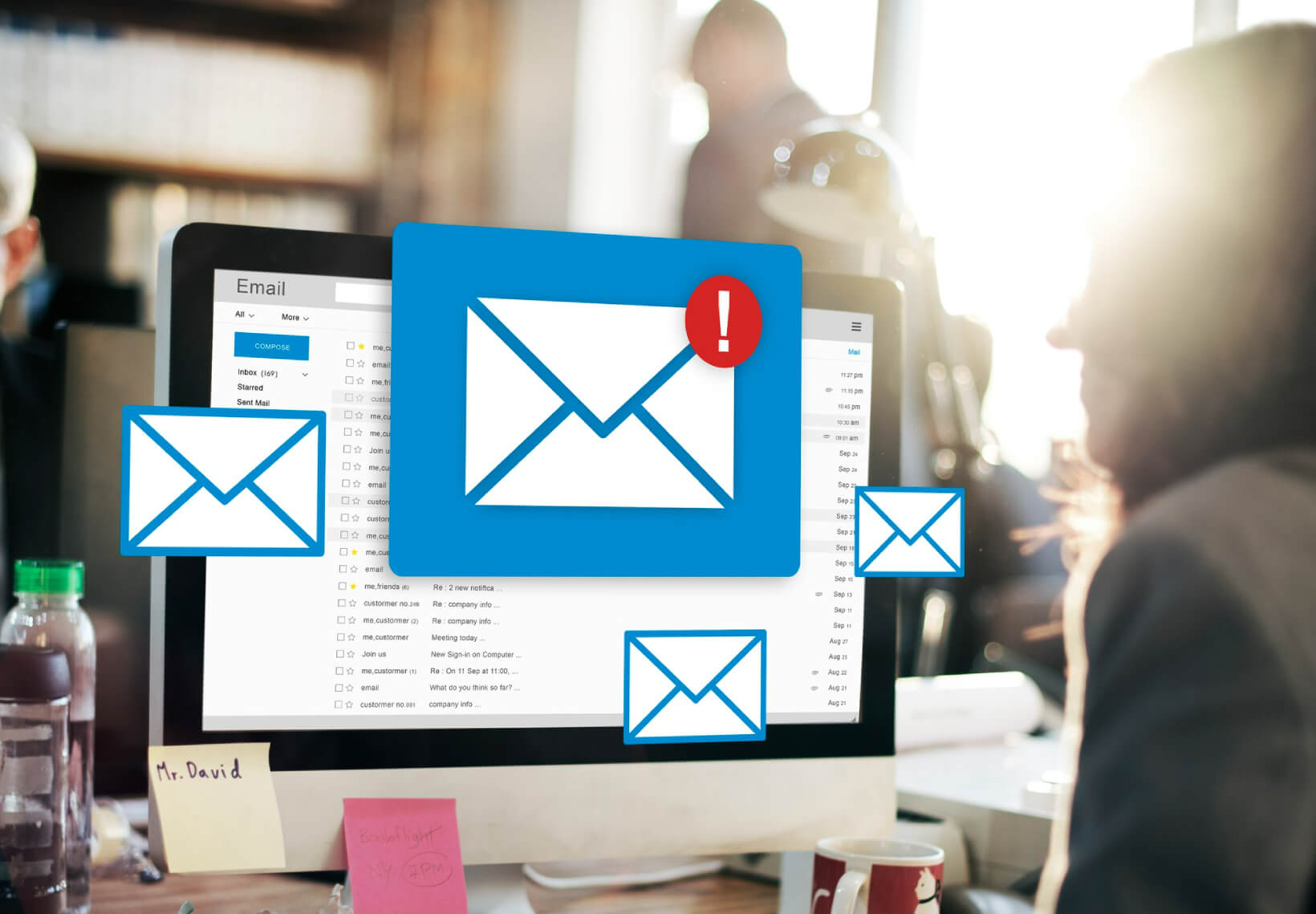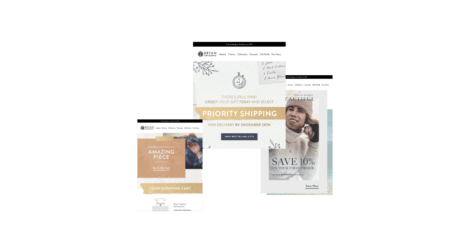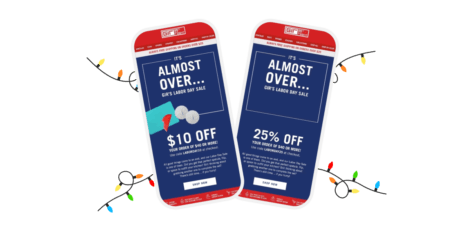In today’s digital age, when consumers are constantly bombarded with information and messages, being distinctive has become more difficult for businesses. This is where the power of personalization in email marketing comes into play. Using targeted email marketing enables you to successfully cut through the clutter and provide messages that connect with recipients on a personal level by adjusting your email campaigns to fit the unique preferences and demands of your target audience.
In this article, we’ll examine the enormous potential of targeted email marketing and offer email marketing tips and tricks that will help provide outstanding results for your company by fostering stronger relationships, increasing engagement, and eventually assisting you in reaching your marketing objectives.
What Is Targeted Email Marketing?
Targeted email marketing is a strategy that involves sending personalized and relevant email campaigns to specific segments of your audience. It aims to provide people with personalized communications based on their interests, demographics, habits, or previous interactions. Additionally, it makes use of automated tools, email marketing software, sophisticated segmentation strategies, and targeted content to deliver powerful messages that strengthen customer connections and improve business outcomes.
Marketers may construct highly targeted email lists and produce content that resonates with consumers by evaluating zero and first-party data like purchase history, surfing habits, or subscription preferences in order to increase engagement, conversion, and customer retention.
5 Types of Targeted Email Marketing
Below we explore five types of targeted email marketing that can help businesses effectively reach their desired audience: gender-targeted email marketing, geo-targeted email marketing, preference-targeted email marketing, behavior-targeted email marketing, and lifecycle-targeted email marketing. Each approach offers unique advantages and opportunities for businesses to connect with their subscribers in a meaningful way and achieve their marketing objectives.
- Gender-Targeted Email Marketing. Gender-targeted email marketing is the practice of personalizing email campaigns to particular genders by employing data analysis and segmentation to give personalized content and offers that speak to the recipient’s gender identification. For instance, if you sell clothes, you should market to men and women differently.
- Geo-Targeted Email Marketing. Use the zip codes, locations, and purchase histories of your subscribers to send customized emails and better target your local audience with offers. Send users an email with a link to the preferences page informing them of upcoming events.
- Preference-Targeted Email Marketing. Take into account users’ interests and preferences in order to send them relevant content. Include a link to the preference center so that your subscribers can select the topics that interest them.
- Behavior-Targeted Email Marketing. Behavior-targeted email marketing is a strategy that delivers personalized emails based on individuals’ past actions, preferences, and online behavior, aiming to increase engagement, conversions, and customer satisfaction.
- Lifecycle-Targeted Email Marketing. Each of your customers takes a different position during their individual customer journey. Your emails should be customized based on the unique characteristics of each stage. Typical customer lifecycles include new subscribers, potential customers (prospects), first-time buyers, cart-abandoners, and loyal customers as possible email target segments.
Benefits of Targeted Email Marketing
Targeted email marketing offers several benefits for businesses looking to reach and engage with their audience. Here are some key advantages of implementing targeted email marketing campaigns:
- Increased Personalization: Targeted email marketing allows businesses to tailor their messages to specific segments of their audience. Businesses can produce personalized content, such as relevant offers, product recommendations, and customized subject lines, by utilizing customer data and preferences. This level of personalization increases the chance of engagement and conversion by fostering a deeper relationship with recipients.
- Improved Customer Engagement and Retention: Businesses can communicate with their customers more deeply thanks to targeted email marketing. Targeted email marketing enables businesses to strengthen relationships, establish trust, and boost consumer loyalty by distributing material that speaks to their audience. Engaged and happy customers are more inclined to more loyal to the company, make more purchases, and become brand advocates.
- Higher Conversion Rates: Conversion rates are much greater when emails are tailored to the interests and demands of their receivers. Businesses can send emails that address consumers’ pain points, offer answers, and provide incentives that suit their tastes by targeting particular segments. This focused strategy raises email marketing campaign efficacy overall and conversion rates.
- Data-Driven Insights: Utilizing targeted email marketing allows companies to learn important information and audience insights. Businesses can assess the success of their efforts by monitoring email open rates, click-through rates, conversion rates, and other metrics, and then make data-driven decisions for optimization. The data can then be used to improve overall marketing initiatives and future email marketing efforts.
- Cost-effectiveness: Targeted email marketing is more affordable than traditional marketing methods. Businesses can use automation solutions to speed up the process of delivering customized emails to different target segments, and the cost per email sent is substantially lower. In other words, businesses can use fewer resources to produce better results with proper audience segmentation and customization.
- Automation and Scalability: Targeted email marketing can be easily automated and scaled to reach a wider audience. Businesses can build automated email sequences, send emails in response to specified events or activities, and arrange email campaigns in advance thanks to automated email marketing tools. This automation and scalability allow businesses to efficiently manage email marketing efforts, even with a growing subscriber base.
- Easy To Measure and Track ROI: With targeted email marketing, it’s relatively easy to track and measure the return on investment (ROI) of campaigns. Businesses can assess the cost per acquisition and compare it to the revenue earned by tracking key KPIs and conversions. With the help of this information, businesses can evaluate the success of their email marketing campaigns and take well-informed decisions to increase their ROI.

Image source: Pexels
The 8 Steps to Executing a Successful Targeted Email Marketing Strategy
Below we offer five essential email marketing tips and tricks that businesses need to follow in order to achieve effective, targeted, and results-driven email campaigns.
Building and Segmenting Your Email List
Building and segmenting your email list is crucial for executing successful targeted email marketing campaigns. The process begins with capturing high-quality leads through various channels, such as website sign-ups, social media campaigns, or lead magnets. Once you have a substantial list, segmentation comes into play.
You can customize your email content to certain groups, assuring relevance and personalization, by classifying subscribers based on their demographics, activity, interests, or past purchases. This focused strategy boosts customer satisfaction, conversion rates, and engagement. Regularly updating and cleaning your list and analyzing metrics allows for continuous optimization and improvement of your email marketing strategy, maximizing its effectiveness in reaching the right audience with the right message.
Collecting and Utilizing Customer Data
Collecting and using customer data is a vital strategy for executing a successful targeted marketing campaign. Businesses can create highly tailored and relevant messages by utilizing insightful data about their consumers’ preferences, actions, and purchasing patterns. They can learn about the demographics, interests, and previous interactions of their customers by using careful zero and first-party data collection techniques like opt-ins, surveys, and website tracking.
With the use of this data, marketers can segment their email contact lists and create messages that appeal to particular consumer categories, boosting the likelihood that those customers will engage with them and convert. By successfully exploiting customer data, businesses can improve customer satisfaction, optimize email marketing campaigns, raise open and click-through rates, and ultimately generate revenue.
Crafting Compelling and Personalized Email Content
Creating compelling and personalized email content is another essential factor for executing successful targeted email marketing campaigns. This is because grabbing the recipient’s attention is vital in a world where emails abound.
Marketers can provide a sense of intimacy and relevancy by adjusting the material to the user’s interests, preferences, and needs. A well-crafted email should be concise, engaging, and focused on providing value. Personalization can be achieved through segmentation, addressing the recipient by name, and referencing their previous interactions. By understanding the target audience and leveraging personalized content, email marketers can increase open rates, and click-through rates, and ultimately drive successful conversions.
Crafting Compelling Subject Lines
Making an appealing and pertinent subject line is essential because the subject line will be the first thing recipients read. A well-crafted subject line grabs the reader’s attention and entices them to open the email. It should be succinct, captivating, and tailored to the requirements and interests of the audience. To get their attention and raise open rates, use customization strategies like mentioning the recipient’s name or making mention of previous contacts.
Subject lines can pique interest and encourage involvement by addressing their pain areas or providing special rewards. Urgency or time-sensitive phrasing is used to encourage recipients to act right away. Testing and analyzing subject line performance allows for optimization and continuous improvement, ensuring higher open rates and conversions in targeted marketing efforts.
Automating Triggered Emails
The success rates of targeted email marketing can be greatly increased by using automation. Businesses can design personalized, dynamic email campaigns that are tailored to the unique requirements and tastes of each client with the use of automated email marketing services. By automatically segmenting the customer base, delivering personalized emails, and monitoring consumer replies, automation speeds up the process.
This strategy increases the likelihood of engagement and conversions by ensuring the correct message reaches the right audience at the right moment. Automation also makes it possible for organizations to nurture leads and establish lasting connections with their audience through effective follow-up processes. Automation may help businesses increase efficiency, boost customer happiness, and ultimately spur corporate growth through customized email marketing.
Personalizing Email Offers and Recommendations
One of the most important tactics for carrying out effective targeted email marketing campaigns is personalizing email offers and recommendations. Businesses can increase engagement and conversion rates by customizing information for each recipient based on their preferences, browsing history, and previous interactions. Effective personalization includes segmenting the audience using data-driven insights, then crafting timely and relevant communications that speak to each recipient individually.
This strategy enables marketers to give unique offers, personalized product recommendations, and content that is tailored to the recipient, leading to higher open and click-through rates and, eventually, higher sales. Personalized email marketing creates a stronger bond with customers and promotes brand loyalty while maximizing the efficiency of email campaigns.

Image source: Pexels
Optimizing Email Deliverability and Engagement
Effective targeted email marketing strategies require optimizing email deliverability and engagement. Maintaining a clean and well-managed email list is crucial for ensuring that your communications reach their intended recipients’ inboxes. This involves routinely checking for and eliminating incorrect or inactive email addresses.
Enhancing your email’s trustworthiness by implementing authentication standards like DKIM, SPF, and DMARC lowers the likelihood that it will be marked as spam. In addition, the likelihood that receivers will open, read, and respond to your emails increases when you create unique and pertinent content that is tailored to your target demographic.
Testing and Adjusting
Test several aspects of your email campaigns on a regular basis, including the CTAs (calls to action), images, and subject lines. Utilize A/B testing to contrast several iterations, then modify your emails in light of the findings. With time, this iterative strategy produces better outcomes and aids in your understanding of what appeals to your audience the most.
To gauge the success of your customized email marketing initiatives, keep an eye on important metrics like open rates, click-through rates, conversion rates, and unsubscribe rates. Utilize these insights to hone your upcoming efforts by analyzing the data to spot trends, patterns, and areas that could use improvement.
The Bottom Line
To sum it up, targeted email marketing has become an effective tool for companies to generate results and connect with their customers on a deeper level. In the current digital ecosystem, where clients are bombarded with innumerable daily communications, the power of customization cannot be emphasized. Businesses can create highly tailored email messages that engage with certain recipients by utilizing data and segmentation tactics, which will increase open rates, click-through rates, and eventually conversions.
In addition to improving the customer journey, the ability to deliver pertinent material, customized offers, and personalized experiences also boosts brand loyalty and promotes long-lasting connections. The potential for personalized email marketing will only increase as technology develops, giving companies a useful way to interact with their customers and produce quantifiable outcomes. Businesses can maximize their email marketing efforts and stay ahead in the rapidly evolving digital marketplace by utilizing the power of customization.
Using Justuno allows you to expand your email subscriber database while effectively connecting with your audience through personalized email marketing campaigns. With Justuno, you have access to a range of powerful marketing tools such as sales promotions, email capture po-pups, relevant messages, comprehensive traffic segmentation, conversion analytics, and other impactful features to engage and convert visitors.Ready to see the Justuno difference? Start a free, 14-day trial to gain access to the premiere conversion automation platform on the market.





